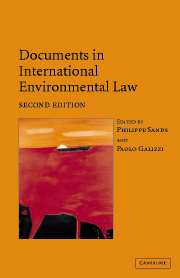Book contents
- Frontmatter
- Contents
- Preface
- PART I General instruments
- PART II Atmosphere
- PART III Oceans: global
- PART IIIB Oceans: regional
- PART IV Freshwater resources
- PART V Biodiversity
- PART VIA Hazardous substances and activities: nuclear
- PART VIB Hazardous substances and activities: pesticides
- PART VIC Hazardous substances and activities: waste
- PART VII Human rights and the environment
- PART VIII War and the environment
- PART IX Trade and the environment
- PART X Environmental impact assessment and access to information
- PART XI Liability for environmental damage and breaches of environmental obligations
- 42 International Convention on Civil Liability for Oil Pollution Damage, 27 November 1992
- 43 International Convention on the Establishment of an International Fund for Compensation for Oil Pollution Damage, 27 November 1992
- 44 Articles on the Responsibility of States for Internationally Wrongful Acts, adopted by the International Law Commission at its fifty-third session, 2001
- 45 Convention on Civil Liability for Damage Resulting from Activities Dangerous to the Environment, 21 June 1993
- 46 International Convention on Liability and Compensation for Damage in Connection with the Carriage of Hazardous and Noxious Substances by Sea, 3 May 1996
- PART XII The Antarctic
44 - Articles on the Responsibility of States for Internationally Wrongful Acts, adopted by the International Law Commission at its fifty-third session, 2001
Published online by Cambridge University Press: 05 June 2012
- Frontmatter
- Contents
- Preface
- PART I General instruments
- PART II Atmosphere
- PART III Oceans: global
- PART IIIB Oceans: regional
- PART IV Freshwater resources
- PART V Biodiversity
- PART VIA Hazardous substances and activities: nuclear
- PART VIB Hazardous substances and activities: pesticides
- PART VIC Hazardous substances and activities: waste
- PART VII Human rights and the environment
- PART VIII War and the environment
- PART IX Trade and the environment
- PART X Environmental impact assessment and access to information
- PART XI Liability for environmental damage and breaches of environmental obligations
- 42 International Convention on Civil Liability for Oil Pollution Damage, 27 November 1992
- 43 International Convention on the Establishment of an International Fund for Compensation for Oil Pollution Damage, 27 November 1992
- 44 Articles on the Responsibility of States for Internationally Wrongful Acts, adopted by the International Law Commission at its fifty-third session, 2001
- 45 Convention on Civil Liability for Damage Resulting from Activities Dangerous to the Environment, 21 June 1993
- 46 International Convention on Liability and Compensation for Damage in Connection with the Carriage of Hazardous and Noxious Substances by Sea, 3 May 1996
- PART XII The Antarctic
Summary
Editorial note
The ILC's Articles on StateResponsibility are an attempt to codify the basic principles of international lawgoverningwrongful acts and their consequences. The ILC divided its task in four parts. Part One is on the internationally wrongful act of a State. Part Two defines the content of the international responsibility of a State. Part Three deals with the implementation of the international responsibility of a State. Part Four contains general provisions. The Articles were adopted by the International Commission at its fifty-third session in 2001.
The central proposition of Part I is that State responsibility is triggered by ‘every internationally wrongful act of a State’ (Article 1), which is defined as an act of State when conduct consisting of an action or omission is attributable to the State under international law and constitutes a breach of an international obligation (Article 2). The characterization of a wrongful act is governed by international law, regardless of the characterization of the same act as lawful by internal law (Article 3). Chapter II, Part One, outlines the rules governing the attribution of acts to a State (Articles 4–11), while Chapter III elaborates on breaches of international obligations (Articles 12–15). Chapter IV outlines the rules governing the responsibility of a State inconnectionwith the act of another State (Articles 16–19). Chapter IV identifies several defences available to a State which preclude wrongfulness, including consent by another State (Article 20), self-defence (Article 21), countermeasures in respect of an internationally wrongful act (Article 22), force majeure (Article 23), distress (Article 24) and necessity (Article 25).
- Type
- Chapter
- Information
- Documents in International Environmental Law , pp. 1224 - 1239Publisher: Cambridge University PressPrint publication year: 2004
- 13
- Cited by



